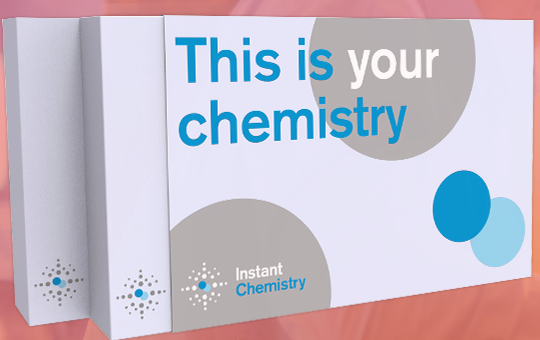Love Connection: DNA Test Measures Genetic Compatibility Via Serotonin Levels To Find Your Perfect Match

When it comes to finding our perfect match, we look at personality, shared interests, and what we find aesthetically pleasing. While all these factors contribute to our compatibility with our love interest, it is not always clear if we’re with “the one.” The days of pulling petals off daises and counting letters in people’s names may now be in the past, as Instant Chemistry, an Ontario, Canada-based firm, has devised the first ever at-home compatibility kit backed by science.
“Through intensive research scientists have found that long-term relationship satisfaction stems from two constants — your DNA and core personality — and how those match up with your partners,” said Dr. Sara Seabrooke, a geneticist, and chief science officer of Instant Chemistry, said in a press release. “The science behind Instant Chemistry’s kits is based on this research. By combining biological and psychological tests, we can determine how compatible you are with your partner and provide ways to offset incompatibilities, for example changing a small habit.”
Seabrooke, alongside her husband, Ron Gonzalez, a psychologist and neuroscientist, was inspired to create Instant Chemistry after seeing how many marriages failed. They believe they can decrease the divorce rates by fhelping couples learn more about themselves and really have an insight that would normally take 10 to 15 years to get, in one day. Seabrooke and Gonzalez’s kit aims to provide couples with valuable insight into three important areas of their relationship: psychological, emotional, and physical.
When it comes to genetic compatibility, diverse genes are favorable for couples, since their offspring is more likely to build a strong immunity to pathogens or infections. "If you have two people come together with very different immune systems and they have a child, the child is getting immune system genes from both the mother and the father," Seabrooke told ABC News. "The more diverse those genes are, the more chance the child has of withstanding different pathogens or infections than if their immune systems were similar between both parents."
The kit is comprised of three tests, including one that compares the genetic strands of two people, to report of their long-term compatibility and chemistry. The biological tests consists of The Relationship Satisfaction test, backed by research from the University of California, Berkeley, to determine how two people’s brains process serotonin. This reveals the differences in their emotional reactions to various situations. The neurochemical serotonin, according to Psychology Today, is triggered by love when a partner respects you or helps you feel respected by others.
Long-Term Chemistry, the second biological test, based on 20 years of research, looks at how well partners’ genetic makeup complements each other. Lastly, this is followed by an online psychological compatibility test to identify each partner’s personality traits, and what it means in terms of stability and happiness in a relationship. The completion of these tests helps Instant Chemistry determine the underlying compatibility of partners, and in turn helps those partners recognize what will help their relationship to further grow, the Daily Mail reported.
"Essentially, we tell you how you and your partner may deal with a conflicted situation," Seabrooke said. "We give you the breakdown of how the genetics plays a role in your relationship and also how psychology plays a role."
Hagan Blount and Katie Smith-Adair, a couple who has been dating for almost a year, took the test because they were interested in the science behind it. Blount and Smith-Adair learned they had a 10 percent genetic compatibility and a 75 percent emotional compatibility score, but they admit they don’t understand what it means. "They didn't explain this at all," Blount said. "I really want more information about the science here. I don't get what any of these numbers mean."
Similar to Blount and Smith-Adair, critics remain skeptical because they believe there isn’t enough data to prove the company’s claims. Variability will naturally exist between two people who take the test, and the test is suspected to over-interpret what happens in life. "It's [a] very low chance that two people have actually come together by chance that are this diverse in their immune system,” Seabrooke said.
Whether the costly $199 chemistry kit has any merit is unknown, but research has shown people find each other more attractive when their MHC genes (part of their immune system) is dissimilar, because it means their offspring will inherit diverse genes for immunity. It has also been proven dopamine levels can influence our attraction to individuals and lead us to smell indicators of fertility, drawing us closer to others we find attractive.
For those highly curious about the chemistry kit, remember, in the end, love is priceless.



























